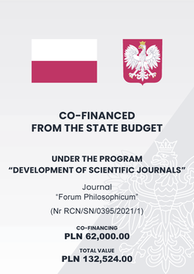- Home »
- Issues »
- 18/1 - Spring 2013 »
- Articles »
Kierkegaard’s Construction of the Human Self
Abstract
The purpose of this article is to analyze Kierkegaard’s philosophical views concerning the problem of the nature of the human self. With the help of a close examination of Kierkegaard’s texts The Concept of Anxiety and The Sickness unto Death, we argue that Kierkegaard “constructs” the human self in a specific way. This way reveals, through the examination by Kierkegaard of “anxiety” and “despair,” three main characteristics of the human self: a) the self is a dynamic process, always “becoming” in time through free will and freedom of choice, b) the human self is always a historical self, so that history is then a direct product of “becoming a self,” and c) the human self, in order to be “whole,” must freely ground itself in a transcendental being (God).
Keywords
Cite this article
Patios, Georgios. “Kierkegaard’s Construction of the Human Self.” Forum Philosophicum 18, no. 1 (2013): 37–47. doi:10.35765/forphil.2013.1801.03.
Bibliography
Evans, C. Stephen. Kierkegaard on Faith and the Self. Waco, TX: Baylor University Press, 2006. Kierkegaard, Søren. The Concept of Anxiety. Translated by Reidar Thomte and Albert B. Anderson. Princeton: Princeton University Press, 1980. Kierkegaard, Søren. The Sickness unto Death. Translated by Howard V. Hong and Edna H. Hong. Princeton: Princeton University Press, 1980. Lubcke, Poul. “Freedom and Morality.” In Kierkegaard and Freedom, edited by James Giles, 93–105. Basingstoke: Palgrave Macmillan, 2000. Mooney, F. Edward. Selves in Discord and Resolve. New York; London: Routledge, 1996.




